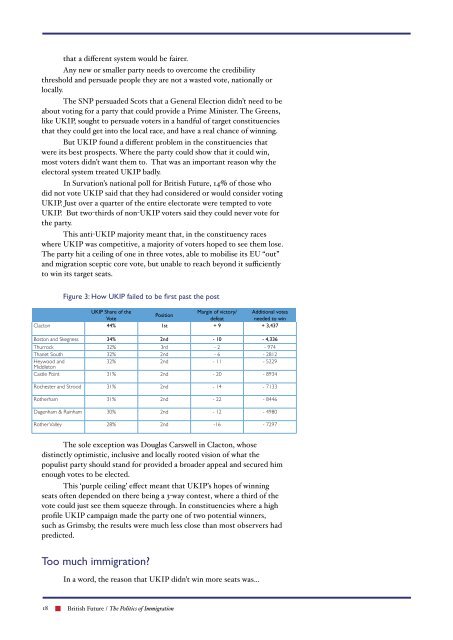THE POLITICS OF IMMIGRATION
The-politics-of-immigration
The-politics-of-immigration
You also want an ePaper? Increase the reach of your titles
YUMPU automatically turns print PDFs into web optimized ePapers that Google loves.
that a different system would be fairer.<br />
Any new or smaller party needs to overcome the credibility<br />
threshold and persuade people they are not a wasted vote, nationally or<br />
locally.<br />
The SNP persuaded Scots that a General Election didn’t need to be<br />
about voting for a party that could provide a Prime Minister. The Greens,<br />
like UKIP, sought to persuade voters in a handful of target constituencies<br />
that they could get into the local race, and have a real chance of winning.<br />
But UKIP found a different problem in the constituencies that<br />
were its best prospects. Where the party could show that it could win,<br />
most voters didn’t want them to. That was an important reason why the<br />
electoral system treated UKIP badly.<br />
In Survation’s national poll for British Future, 14% of those who<br />
did not vote UKIP said that they had considered or would consider voting<br />
UKIP. Just over a quarter of the entire electorate were tempted to vote<br />
UKIP. But two-thirds of non-UKIP voters said they could never vote for<br />
the party.<br />
This anti-UKIP majority meant that, in the constituency races<br />
where UKIP was competitive, a majority of voters hoped to see them lose.<br />
The party hit a ceiling of one in three votes, able to mobilise its EU “out”<br />
and migration sceptic core vote, but unable to reach beyond it sufficiently<br />
to win its target seats.<br />
Figure 3: How UKIP failed to be first past the post<br />
UKIP Share of the<br />
Margin of victory/ Additional votes<br />
Position<br />
Vote<br />
defeat<br />
needed to win<br />
Clacton 44% 1st + 9 + 3,437<br />
Boston and Skegness 34% 2nd - 10 - 4,336<br />
Thurrock 32% 3rd - 2 - 974<br />
Thanet South 32% 2nd - 6 - 2812<br />
Heywood and<br />
32% 2nd - 11 - 5229<br />
Middleton<br />
Castle Point 31% 2nd - 20 - 8934<br />
Rochester and Strood 31% 2nd - 14 - 7133<br />
Rotherham 31% 2nd - 22 - 8446<br />
Dagenham & Rainham 30% 2nd - 12 - 4980<br />
Rother Valley 28% 2nd -16 - 7297<br />
The sole exception was Douglas Carswell in Clacton, whose<br />
distinctly optimistic, inclusive and locally rooted vision of what the<br />
populist party should stand for provided a broader appeal and secured him<br />
enough votes to be elected.<br />
This ‘purple ceiling’ effect meant that UKIP’s hopes of winning<br />
seats often depended on there being a 3-way contest, where a third of the<br />
vote could just see them squeeze through. In constituencies where a high<br />
profile UKIP campaign made the party one of two potential winners,<br />
such as Grimsby, the results were much less close than most observers had<br />
predicted.<br />
Too much immigration?<br />
In a word, the reason that UKIP didn’t win more seats was…<br />
18 British Future / The Politics of Immigration


